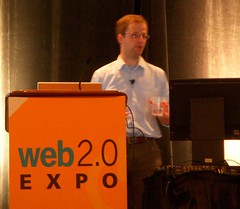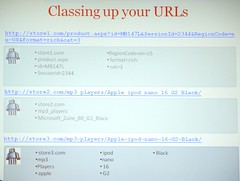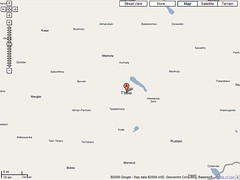Town Creates Smiley Face in Google Maps
Saw this interesting thing on Slashdot today:
Apparently this Russian town got a crowd of people to don yellow slickers and stand in a large smiley face pattern so that Google Earth and Google Maps could capture them in their next update.
Trick is, the Google Map screen-grab appears to be a very obvious hoax by a blogger dubbed “Heiner Wolf“. According to these photos, people really did turn out to form the smiley face — I would guess as part of a radio station promotion. But this blogger transposed the people onto the Google Maps image of the area. Lame!
There are plenty of instances of messages appearing in Google Maps pics, if you want to see real ones: examples of roof ads, cool things in Google Maps, marriage proposals, and the infamous Swastika Building.
Possible Related Posts
Posted by Chris of Silvery on 09/25/2008
Permalink | |  Print
| Trackback | Comments (0) | Comments RSS
Print
| Trackback | Comments (0) | Comments RSS
Filed under: Google, Maps aerial-images, Google-Maps, hoaxes, Satellite-Images
Google Street View Icon In Party Clothes
The Google Street View dude icon is suddenly sporting a party hat and balloons:
Assumably the special icon is celebrating Google’s 10th Birthday, though there’s no mention of it on the Google Lat Long Blog.
Possible Related Posts
Posted by Chris of Silvery on 09/23/2008
Permalink | |  Print
| Trackback | Comments (0) | Comments RSS
Print
| Trackback | Comments (0) | Comments RSS
Filed under: Google, Maps Google, Google-Maps, Street View
MS Live Search Tip: Keyworded URLs
 I was pleased to sit in a presentation by Nathan Buggia last week at the Web 2.0 Expo conference in New York. Nathan is the Lead Program Manager for Microsoft’s Live Search Webmaster Center, and his talk was on “Getting More Traffic from Search: Advanced SEO for Developers“.
I was pleased to sit in a presentation by Nathan Buggia last week at the Web 2.0 Expo conference in New York. Nathan is the Lead Program Manager for Microsoft’s Live Search Webmaster Center, and his talk was on “Getting More Traffic from Search: Advanced SEO for Developers“.
One of the more interesting things that Nathan covered were factors which provide specific benefit to page rankings in Live Search.
It was striking when he covered one element in particular: URL formatting.
Nathan stated that URLs which were shorter and which contain valuable keywords are likely to provide greater keyword relevancy benefit to pages which have them. URLs which are shorter and which have richer words that describe a page’s content work better for endusers and for marketing purposes. Users seeing a keyword-rich URL are more likely to click on them when they see them in search results page listings, because they reinforce the perception that they contain what the user is seeking. URLs also should have keywords delimited by dashes, rather than underscores or even periods.
Check out this slide from his presentation which demonstrates how keywords within the URL can provide additional signal to a page for the terms they represent:
Have difficulty in adding keyword URLs to your site? This is one of the things which GravityStream provides automatically (or even manually-generated). GravityStream proxies a site in order to automatically optimize a great many search ranking factors, including keyword-rich URLs.
Possible Related Posts
Posted by Chris of Silvery on 09/22/2008
Permalink | |  Print
| Trackback | Comments (0) | Comments RSS
Print
| Trackback | Comments (0) | Comments RSS
Filed under: MSN Search, Search Engine Optimization, SEO GravityStream, Live-Search, Nathan Buggia, SEO
Google Launches Audio Search
Google Labs has launched an experimental audio search which allows one to search text within YouTube videos. “Google Audio Indexing“, it’s called.

On the backend, Google has taken the audio tracks of YouTube videos of politicians, and automatically converted it to text for search capability.
How will this impact the overall internet? (more…)
Possible Related Posts
Posted by Chris of Silvery on 09/17/2008
Permalink | |  Print
| Trackback | Comments (0) | Comments RSS
Print
| Trackback | Comments (0) | Comments RSS
Filed under: Google blended search, Google Audio, video search, YouTube
Why avoiding meta keywords tag may be best
Around a year ago, Danny Sullivan did some great research on the Meta Keywords tag to determine which search engines are using it. He found indication that Google and Microsoft Live Search ignore it for keyword ranking (retrieval) purposes, while Yahoo! and Ask are apparently using it. With Google having the bulk of the search marketshare, and Yahoo possibly only using the tag to a limited degree, it would seem rather extraneous to continue using it for search optimization.
Although his research was really pretty definitive in my mind, there are so many search marketers that have some sort of nostalgic devotion to the tag and who continue to obsess over it and insist upon using it. There is a sort of mentality that “if it might help, then I’m damn well going to use it.” (See this recent thread at WebMasterWorld where quite a few express this viewpoint.)
However, I see some compelling reasons to avoid using it altogether… (more…)
Possible Related Posts
Posted by Chris of Silvery on 09/15/2008
Permalink | |  Print
| Trackback | Comments (0) | Comments RSS
Print
| Trackback | Comments (0) | Comments RSS
Filed under: Best Practices, HTML Optimization, Search Engine Optimization, SEO, Worst Practices meta keywords, meta tag, metatags
Local Search & Social Media Company Praized Worth Watching
 Praized, a startup that offers a social media app targeted to locally-oriented blogs and sites, is well worth watching. The app allows blogs to easily provide their constituents the ability to rate local businesses, and display the ratings alongside the traditional directory info of biz name, address, and maps.
Praized, a startup that offers a social media app targeted to locally-oriented blogs and sites, is well worth watching. The app allows blogs to easily provide their constituents the ability to rate local businesses, and display the ratings alongside the traditional directory info of biz name, address, and maps.
(Try out their local search engine to view businesses and ratings.)
Praized was built by some local search veterans from the Yellow Pages Group, and it’s already managed to nab small dribbles of acclaim — most recently, it was named a finalist in Red Herring’s Canada’s Top 50 Canada award which recognized the year’s most promising private technology ventures in Canada. (more…)
Possible Related Posts
Posted by Chris of Silvery on 09/05/2008
Permalink | |  Print
| Trackback | Comments (0) | Comments RSS
Print
| Trackback | Comments (0) | Comments RSS
Filed under: Local Search, technology, Tools apps, blog apps, Local Search, Praized, Social-Media
Cleaning up the Retail Site Navigation Mess
Beware: If you are an online retailer that has implemented “attribute-based” or “guided navigation” schemes to make it easier for your shoppers to filter your products, stop what you’re doing, read my Search Engine Land article that published today.
The technology may be great for users and conversion rates – but you can expect a lump of coal in your stocking from Google this Christmas. Find out why, what to do next: http://searchengineland.com/080904-175800.php
Brian
Possible Related Posts
Posted by Brian of Brian on 09/04/2008
Permalink | |  Print
| Trackback | Comments (0) | Comments RSS
Print
| Trackback | Comments (0) | Comments RSS
Filed under: Advertising
Google Adds Data to Georgia Maps?
Google announced additional map data for Georgia today on the Lat Long Blog, along with a few other countries.
This announcement comes on the heels of explanations a few weeks ago about why Google Maps was missing data for the Georgian Republic. A number of sources on the internet had claimed that Google had yanked map data for Georgia in order to not be facilitating the war that sparked in the region with Russia. Google stated that this was untrue — that the region had never had detailed roads displayed because they didn’t have a good source of information for the area yet. (I was one of the people duped by the spurious claims — surprising, since it’s patently apparent that the Russian military would ALREADY have good maps of their region!)
However, even though it’s great that Google is beefing up their map data, I have to say that publicising it and releasing it as they have done seems terribly precipitate. If you look at the screengrab above, you’ll see that the map data they added is just city name labels — no streets or roads connecting them up — and not even dots or outlines to show where the cities are actually located! (more…)
Possible Related Posts
Posted by Chris of Silvery on 09/04/2008
Permalink | |  Print
| Trackback | Comments (0) | Comments RSS
Print
| Trackback | Comments (0) | Comments RSS
Filed under: Google, Maps Georgia, Google-Maps
NebuAd Aborts Big Brother
 The Washington Post today reported that NebuAd has halted plans to deploy the deep-packet inspection tracking of internet users for their advertising platform. I’d earlier predicted that consumer sensitivity about NebuAd could derail their business plans, and I reported how lawmakers pressured and ISP not to share data with NebuAd.
The Washington Post today reported that NebuAd has halted plans to deploy the deep-packet inspection tracking of internet users for their advertising platform. I’d earlier predicted that consumer sensitivity about NebuAd could derail their business plans, and I reported how lawmakers pressured and ISP not to share data with NebuAd.
Meanwhile, Congress is examining issues around exploiting user data for behavioral marketing and targeted advertising, and the heavy uncertainty in the air would make NebuAd’s entire business modle appear to be a very unstable foundation. (more…)
Possible Related Posts
Posted by Chris of Silvery on 09/04/2008
Permalink | |  Print
| Trackback | Comments (0) | Comments RSS
Print
| Trackback | Comments (0) | Comments RSS
Filed under: Advertising behavioral targeting, deep-packet inspection, Internet Privacy, NebuAd
Chrome – Google Browser Launching
Google has officially confirmed that they’ll be launching “Chrome” — their newly developed, open-source browser, into the wild tomorrow for the Windows platform.
If you recall, I’d previously posted about rumors of a Google browser here and here a year ago, despite Google executives previously indicating that they would not build another browser. A number of other analysts dismissed my observations that a Google browser would be advantageous to the company and complimentary to their various other applications and services – but, I’m now proved right and Google’s efforts to obscure the fact of their browser initiatives appear in retrospect to have been intended to keep the whole thing as top secret as possible until deployment. In 2006, Google CEO Eric Schmidt had stated, “We would only do so…if we thought there was a real user benefit.” (more…)
Possible Related Posts
Posted by Chris of Silvery on 09/02/2008
Permalink | |  Print
| Trackback | Comments (0) | Comments RSS
Print
| Trackback | Comments (0) | Comments RSS
Filed under: Google browsers, Chrome, Google, Google Chrome








